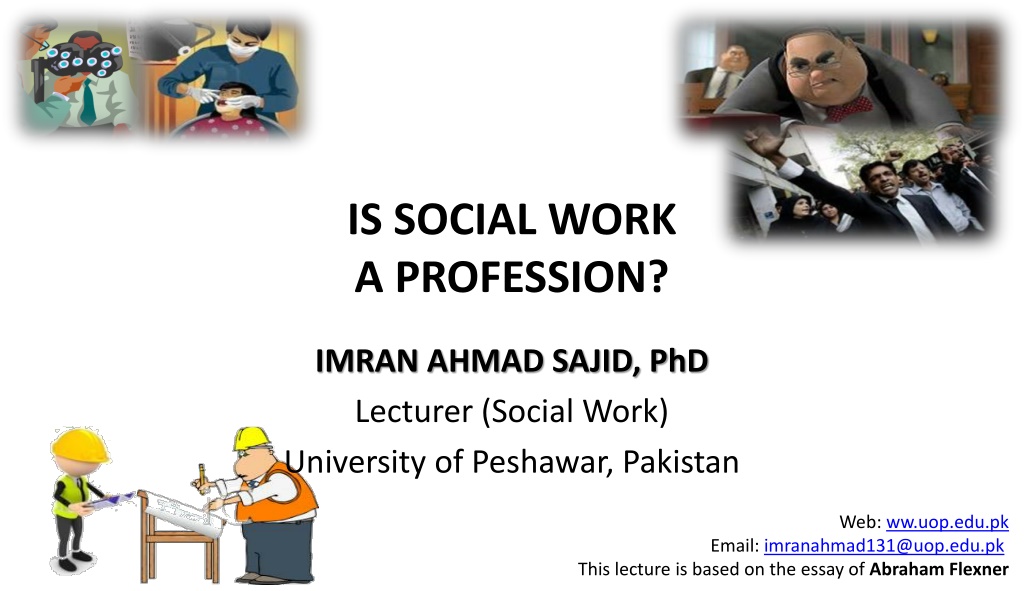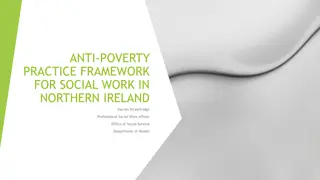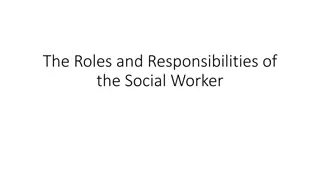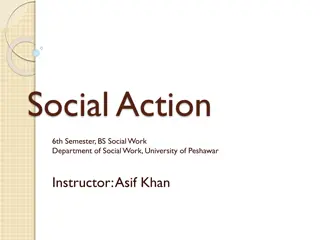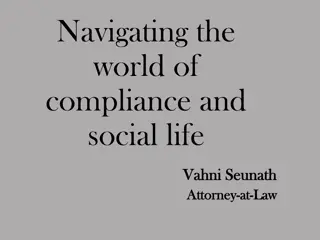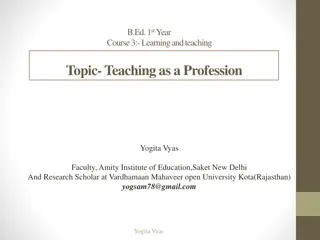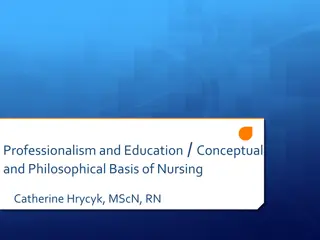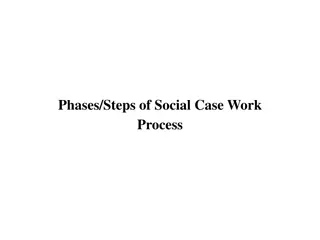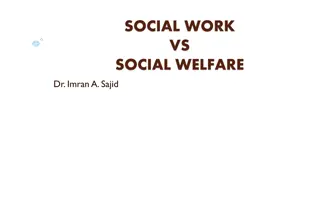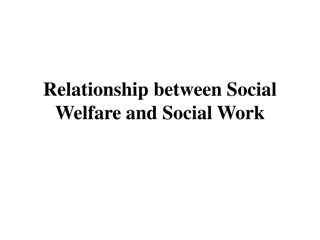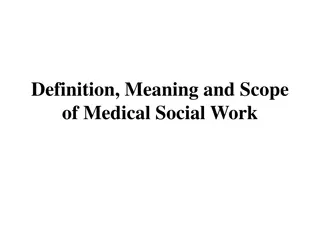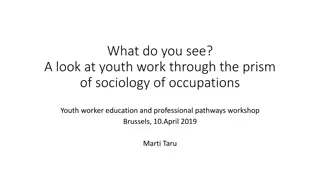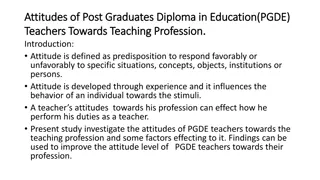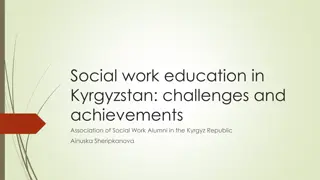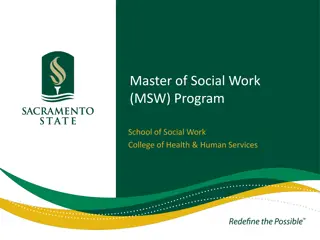Understanding Social Work as a Profession
Social work is considered a profession for those who dedicate their full-time efforts to it, distinguishing themselves from amateurs who engage in philanthropy on a more casual basis. The commitment and time investment required for various occupations contribute to their classification as professions, encompassing diverse fields such as medicine, law, music, and more. However, the term "profession" can become vague if applied broadly to activities like dancing or sports.
Download Presentation

Please find below an Image/Link to download the presentation.
The content on the website is provided AS IS for your information and personal use only. It may not be sold, licensed, or shared on other websites without obtaining consent from the author. Download presentation by click this link. If you encounter any issues during the download, it is possible that the publisher has removed the file from their server.
E N D
Presentation Transcript
IS SOCIAL WORK A PROFESSION? IMRAN AHMAD SAJID, PhD Lecturer (Social Work) University of Peshawar, Pakistan Web: ww.uop.edu.pk Email: imranahmad131@uop.edu.pk This lecture is based on the essay of Abraham Flexner
The word "profession" or "professional" may be loosely or strictly used. In its, broadest significance it is simply the opposite of the word "amateur." A person is, in this sense, a "professional" if his entire time is devoted to an activity, as against one who is only transiently or provisionally so engaged. Amateur: Unskilled person, somebody doing something for pleasure
Social work is, from this point of view, a profession for those who make a full-time job of it; It is not a profession for those who incidentally contribute part of themselves to active philanthropy.
However, every difficult occupation requires the entire time of those who take it seriously.
Almost any occupation, not obviously a business, is apt to classify itself as a profession. Doctors, lawyers, preachers, musicians, engineers, journalists, trained nurses, and dancing masters all speak of their "profession".
If there is a dancing profession, a baseball profession, an acting profession, a nursing profession, an artistic profession, a musical profession, a medical profession, and a legal profession to mention no others the term profession is too vague to be fought for.
But to make a profession in the genuine sense, something more than a mere claim or an academic degree is needed. There are certain objective standards that can be formulated. Social work is interested in being recognized as a profession only if the term is limited to activities possessing these criteria.
There are a few professions universally admitted to be such, Law, Medicine, and Engineering Let us set a criteria for a profession with the help of above three professions.
Criteria for a Profession 1. Intellectual Activity and Individual Responsibility 2. Profession is Learned 3. Profession has a Practical Object 4. Profession possess an Educationally Communicable Technique 5. Self-organization through a Professional Association 6. Becoming Altruistic in Motivation CRITERIA: standard for judging things : or an accepted standard used in making a decision or judgment about something.
1. Intellectual* Activity and Individual Responsibility The first mark of a profession is that the activities involved are essentially intellectual in character. Manual work is not necessarily excluded; the use of tools is not necessarily excluded. But the activity is mainly Intellectual in nature. *relating to thought process
The real character of the activity is the Thinking Process. Doctors, Engineers, and legal attorneys, their activities involve a lot of thinking. That is characteristic of a profession.
Individual Responsibility Wherever intelligence plays freely, the responsibility of the practitioner is at once large and personal. The problems to be dealt with are complicated; The facilities at hand, more or less abundant and various; the agent physician, engineer, lawyer, or social worker exercises a very large discretion* as to what he shall do. *freedom to decide
2. Profession is Learned The second criterion of the profession is that it is learned, There is constant learning.
3. Profession is has a Practical Object Professions are definitely practical. They have a practical objective. The professional man must have an absolutely definite and practical object. His processes are essentially intellectual; his raw material is derived from the world of learning; thereupon he must do with it a clean-cut, concrete task.
Review 1. Intellectual Activity and Individual Responsibility 2. Learned Activity 3. Practical objective
4. Profession possesses an Educationally Communicable Technique Each of the mentioned profession (i.e. law, medicine, engineering), possesses a technique capable of communication through an orderly and highly specialized educational discipline. the members of a given profession are pretty well agreed as to the specific objects that the profession seeks to fulfill, and the specific kinds of skill that the practitioner of the profession must master in order to attain the object in question. 1 3 2 4
5. Self-organization through a Professional Association A profession is a brotherhood almost a caste. They organize themselves in the form of a professional institution/organization. A strong class consciousness. We call this brotherhood as a Professional Association. 5 1 3 4 2
6. Becoming Altruistic in Motivation On the whole, organized groups of this kind are, under democratic conditions, apt to be more responsive to public interest than are unorganized and isolated individuals. The professional organization is explicitly and admittedly meant for the advancement of the common social interest. Devotion to well-doing is more and more likely to become an accepted mark of professional activity;
Let me now review briefly the six criteria which we have mentioned: 1. professions involve essentially intellectual operations with large individual responsibility; 2. they derive their raw material from science and learning; 3. this material they work up to a practical and definite end; 4. they possess an educationally communicable technique; 5. they tend to self-organization; 6. they are becoming increasingly altruistic in motivation.
Professional Characteristics 1. Definite in Purpose 2. techniques communicable through education. 3. Organized in associations Objections 1. Mechanical Activity (Act on Instruments) 2. Data used comes from experience instead of immediate science and learning 3. No altruistic ambitions IT S A HANDICRAFT
Professional Characteristics 1. Definite Purpose 2. Intellectual Activity 3. Class Consciousness (Professional Associations) Objections 1. Motivated only for Financial Profit IT S A TRADE
Professional Characteristics 1. Definite in Purpose 2. Techniques communicable 3. Knowledge comes from Learning Objections 1. Responsibility is not primary IT S A HIGHER FORM OF HANDICRAFT
Social Work In 1926, when Abraham Flaxner wrote this essay, Social Work was not a recognized profession. But today, it is a profession. Because it involves 1. Intellectual Activity 2. Personal Responsibility 3. Definite in Purpose 4. Techniques communicable through educational discipline 5. Class consciousness (Professional association) 6. Altruistic in motivation IT S A PROFESSION
In Pakistan professional association exists but not officially recognized as of yet. APSW All Pakistan Social Workers Association
